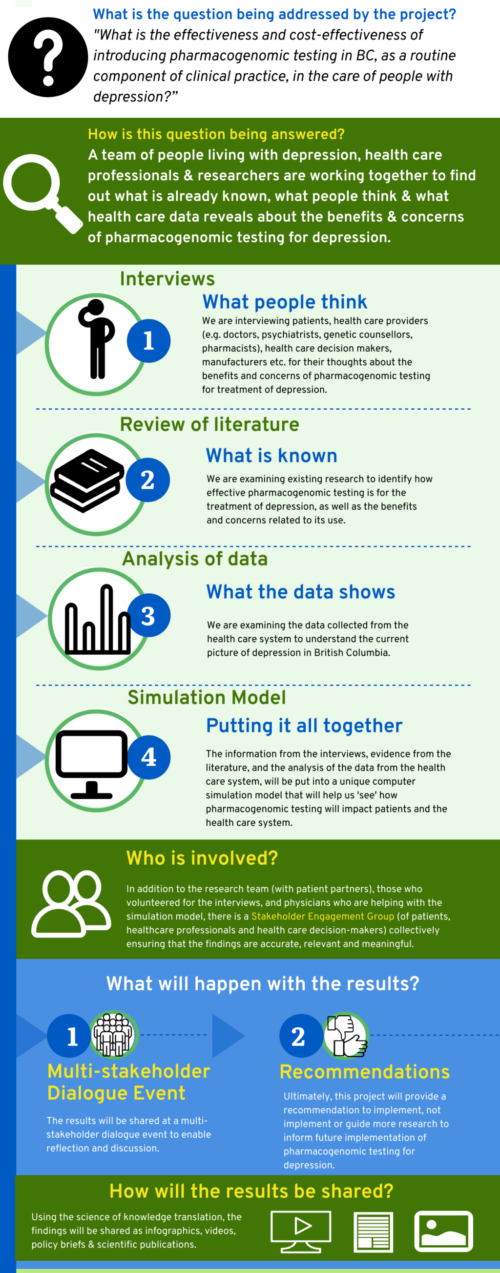
We acknowledge that the UBC Vancouver campus is situated on the traditional, ancestral, and unceded territory of the xʷməθkʷəy̓əm (Musqueam).
Pharmacogenomics for Depression Study
Welcome to our study page! We are a team of people with very different backgrounds and skills, including patient partners, researchers, and clinicians. In this project, we are interested in whether a type of genetic testing called “pharmacogenomic testing” might improve drug therapy for major depressive disorder.

About the Project
Our work involves reviewing research that others have already done, as well as conducting interviews with patients, doctors, nurses, pharmacists, counsellors, and others to see what they think about pharmacogenomic testing for depression care. We will use this information, along with administrative data from BC health records, in a computer simulation model. The simulation model includes thousands of hypothetical patients, and it is designed to assesses the health outcomes and costs associated with pharmacogenomic testing.
Background Information
Major depressive disorder (MDD) is a common mental health condition for which there are many effective treatments. Antidepressant medications are often used to treat MDD and there are many different antidepressants to choose from. As it currently stands in BC, finding a medication that is effective and that does not cause side effects is a matter of trial-and-error. People with MDD may undergo several trials before finding an antidepressant that fits these criteria, as people respond differently to different medications.
The differences in how people respond to medications are thought to be partially determined by our genes. A new and promising approach called “pharmacogenomic testing” is designed to see if an individual’s genetic makeup is suitable for a particular drug.
In this study, we want to know if pharmacogenomic (PGx) testing should be routinely used in BC when caring for people with depression. We want to know if it will improve patient health overall, and see if the testing is good value for money for the health system.
Where to get help:
- Phone Call:
- 9-8-8 National Suicide Crisis Helpline
- 310-6789 BC Mental Health & Crisis Response (no area code needed); over 140 languages available, ask for an interpreter
- 1-800-784-2433 BC Suicide Prevention and Intervention Line; over 140 languages available, ask for an interpreter
- Text or Online Chat:
- 9-8-8 National Suicide Crisis Helpline
- www.YouthInBC.com Online Chat Service for Youth (noon to 1am every day)
- www.CrisisCentreChat.ca Online Chat Service for Adults (noon to 1am every day)
Useful resources for choosing a PGx test:
- Government of BC (Ministry of Health) Booklet: Pharmacogenomics Testing: Guidance for Patients
- Academic paper outlining important issues to consider when choosing a pharmacogenomic test: Bousman et al. 2019: “Navigating the Labyrinth of Pharmacogenetic Testing: A Guide to Test Selection”
- Academic paper that lists some of the pharmacogenomic test options in Canada (see Table 2 for a summary): Maruf et al. 2020: “Pharmacogenetic Testing Options Relevant to Psychiatry in Canada”
About the Team
Principal Investigators
Jehannine Austin, PhD, MSc (Genetic Counselling), CCGC/CGC/FCAHS (They/Them)

Dr. Jehannine Austin is Executive director of the BC Mental Health and Substance Use Services Research Institute, and is a Professor in Psychiatry & Medical Genetics at the University of British Columbia. Jehannine is a board-certified genetic counsellor and their research work involves studying the impact of genetic counselling for people with psychiatric disorders and their families. They founded the world’s first specialist psychiatric genetic counselling service that has won an award for its impact on patient outcomes, and in addition to peer-reviewed publications, has written a book, and won awards for teaching, leadership, and research. Jehannine is a member of the College of the Royal Society of Canada, and a Fellow of the Canadian Academy of Health Sciences.
I do the work I do because of my personal and family history of mental illness. I live with anxiety and depression, so my work is really meaningful to me. Through my work I hope to leave things in a better way than I found them. My role in the team is to ensure that the rest of the team has what they need in order to get their work done, grow, and thrive. I get my deepest sense of fulfillment from mentoring, helping people to figure out who they are and what THEY want to contribute. I am a first generation academic who identifies as pan and agender. I enjoy food (eating, cooking, gathering), the outdoors (hiking, diving, biking, snowboarding), and high intensity group exercise classes – especially barbells, spending time with my partner and cats, and reading (esp. Feminist sci-fi/speculative fiction).
Twitter: @J9_Austin
Stirling Bryan, PhD, FCAHS (He/His)

Dr. Stirling Bryan is health economist with extensive experience of engagement with the health policy and decision-making worlds. He began his career in the United Kingdom with appointments at St Thomas’ Hospital Medical School and then Brunel University, before moving to the University of Birmingham in 1997.
His research track-record reveals a long-standing goal of informing health policy and practice, demonstrated, in part, through an extensive engagement with the National Institute for Health & Care Excellence (NICE). In 2005 he was awarded a Commonwealth Fund Harkness Fellowship and spent one year at Stanford University, researching health technology coverage decision making in US health care organizations.
Stirling immigrated to Canada in 2008, taking on the roles of professor in UBC’s School of Population & Public Health, and director of the Centre for Clinical Epidemiology & Evaluation (C2E2). He provided leadership for C2E2 through until 2018 and remains a senior scientist at the Centre where his research lab and team are located. Over recent years, he has become a strong advocate for, and practitioner of, patient-oriented research, and now partners with patients in all of his research activities.
In 2016, he was appointed Scientific Director for the BC SUPPORT Unit, a component part of BC’s Academic Health Science Network (BC AHSN) focused on promoting patient-oriented research, and in January 2020 stepped into the leadership role for BC AHSN as President. He played that role until September 2021, helping to navigate the course through to consolidation of BC AHSN with the Michael Smith Foundation for Health Research.
Stirling is a Fellow of the Canadian Academy of Health Sciences, and recently completed his term as Chair of the Advisory Board for CIHR’s Institute for Health Services & Policy Research. He currently serves as President Elect for the Canadian Association for Health Services & Policy Research, and is co-editor for the Wiley-published journal, Health Economics.
Twitter: @StirlingBryan
Research Project Manager
Louisa Edwards, PhD

A social psychologist (PhD) with 10+ years’ research experience in primary care and population-based healthcare, currently a Research Program Manager jointly appointed by the University of British Columbia & Vancouver Coastal Health Research Institute. I work across projects using various genetic technologies for long-term conditions (major depressive disorder, end-stage kidney disease). I’m interested in the interplay between motivation for seeking treatment, patient expectations, engaging with a treatment approach, and how these affect health and well-being outcomes. As the mother of two little rascals, I’m a frequent visitor of parks, hiking trails, campsites and beaches. I love being near any kind of water, and so feel very lucky to live on the beautiful west coast!
Twitter: @louisa_edwards3
ORCID: 0000-0001-9371-2805
Team Members
Activity 1 – Led by Jehannine Austin
Rolan Batallones
Stirling Bryan
Louisa Edwards
Alison Hoens
Ginny L.
Emily Morris
Linda Riches
Lisa Ridgway
Caitlin Slomp
Activity 2 Lead: Gavin Wong, PhD

Gavin Wong is a research scientist with the Centre for Clinical Epidemiology and Evaluation (C2E2). Gavin completed his bachelor’s degree in respiratory therapy at the Ohio State University in 2006 and his Ph.D. in pharmacology at UBC in 2014. He has been a registered respiratory therapist with the Canadian Society of Respiratory Therapists since 2009. He has extensive experience in conducting systematic reviews and indirect comparisons. He authored numerous reports that were sent to the government to help health policy decisions at both federal and provincial levels. He is a Cochrane editor with the Cochrane Hypertension group as well as the author of several Cochrane reviews. His research interests include systematic review, network meta-analysis, and applying evidence to the care pathway. Gavin enjoys photography and driving around looking for photogenic spots. You might find him in parks, beaches, or on top of a building snapping photos on the weekend.
Activity 2 Team
Stirling Bryan
Mary Bunka
Louisa Edwards
Dan Kim
Lisa Ridgway
Gavin Wong
Activity 3 Lead: Shahzad Ghanbarian, PhD

Dr. Shahzad Ghanbarian is a Mathematical modeler at C2E2. She specializes in developing statistical models and data analysis tools. Shahzad completed her PhD in Computational Biophysics at UBC in 2015. After completing her PhD, she decided to bring her analytical techniques to health sciences. She completed her post-doctoral fellowship on mathematical modeling of COPD at UBC in 2017.
She is currently working on statistical modeling, cost-effectiveness evaluation, and budget-impact analysis of different non-drug health technologies.
Activity 3 Team
Jehannine Austin
Stirling Bryan
Mary Bunka
Tania Conte
Sonya Cressman
Louisa Edwards
Shahzad Ghanbarian
Ginny L.
Kim McGrail
Morgan Price
Linda Riches
Gavin Wong
Activity 4 Lead: Kim McGrail, PhD

Kimberlyn McGrail is a Professor in the UBC School of Population and Public Health and Centre for Health Services and Policy Research, Director of Research for UBC Health, and Scientific Director of Population Data BC and Health Data Research Network Canada. Her research interests are quantitative policy evaluation and all aspects of population data science. Kim is Deputy Editor of the International Journal of Population Data Science, the 2009-10 Commonwealth Fund Harkness Associate in Health Care Policy and Practice, 2016 recipient of the Cortlandt JG Mackenzie Prize for Excellence in Teaching, and 2017 recipient of a UBC award for Excellence in Clinical or Applied Research. She is currently a member of the Global Partnership for AI as part of both the Data Governance Working Group. She is also part of the Expert Advisory Group for the pan-Canadian Health Data Strategy.
Activity 4 Team
Tania Conte
Louisa Edwards
Shahzad Ghanbarian
Sandra Peterson
Rohit Vijh
Zeina Waheed
Activity 5 Lead: Alison Hoens, MSc, BScPT, PGSportsPT

I am a clinical professor and knowledge broker in the Department of Physical Therapy at UBC and a research associate at the university’s Centre for Advancing Health Outcomes. I’m also an affiliate knowledge broker with Arthritis Research Canada. My work focuses on helping teams of patients, healthcare professionals, researchers and healthcare decision-makers to collaboratively explore issues of shared interest then create, share and use knowledge that can address the problems they identified. I find joy in exploring nature and baking on Sundays.
Twitter: @PhysioKTBroker
ORCID: 0000-0002-9533-9079
Activity 5 Team
Jehannine Austin
Stirling Bryan
Louisa Edwards
Taylor I.
Linda Riches
Project Details
Activity 1 – Patient and healthcare professional perceptions and experiences of pharmacogenomics
Purpose: to understand patient and healthcare professionals’ perceptions of and previous experiences with pharmacogenomics (PGx) testing. We also want to know what they will identify as barriers and facilitators to implementation. These data will allow us to identify potential stakeholder views whose data is important to incorporate into the simulation model (Activity 3).
Activity 2 – Environmental scan and rapid review of pharmacogenomics for depression
Purpose: to examine the clinical- and cost-effectiveness of PGx testing in helping to determine appropriate pharmacotherapy for patients with depression. In cases where existing administrative data is not available or suitable, these data will be incorporated into the simulation model (Activity 3).
Activity 3 – Simulation model development and model-based economic analysis
Purpose: to develop a simulation model (i.e., a microsimulation-Markov model) of care pathways for people with depression in BC. This model will provide the analytic infrastructure and deliver predictions of the benefits and costs associated with PGx tests for people with depression in BC.
Check out our video, produced in collaboration with the Peer Models Network, to learn more about the model!
Activity 4 – Administrative data collation and analyses
Purpose: use existing administrative and clinical datasets from Population Data BC to select a cohort of patients with depression. We will look at demographic characteristics, prescriptions for antidepressants, health services used/accessed (e.g., hospital admissions, number of GP appointments), and costs. Such data will be available to populate and tailor the simulation model specifically to the BC context.
Activity 5 – Ongoing stakeholder and end-user engagement and multi-stakeholder dialogue event
Purpose: engage relevant stakeholders using varying methods of consultation and involvement according to the different groups, their roles, and the activities of this project. This forms an integrated-knowledge translation approach, which means it is conducted throughout this project.
Useful Resources
More information about pharmacogenomics and MDD:
- MayoClinic Quick Overview
Publications & Presentations
Videos
- Pharmacogenomic Testing for Major Depression: A Simulation Model
- Simulation Model of Treatments for Major Depression: Pharmacogenomic Testing and Beyond
Journal Publications
- Cost-Effectiveness
Ghanbarian S, Wong G W K, Bunka M, Edwards L, Cressman S, Conte T, Price M, Schuetz C, Riches L, Landry G, Erickson D, McGrail K, Peterson S, Vijh R, Hoens A M, Austin J, Bryan S. Cost-effectiveness of pharmacogenomic-guided treatment for major depression. CMAJ 2023
DOI: 10.1503/cmaj.221785 - Patient Partner Perspectives
Riches L, Ridgway L, Edwards L. Co-learning commentary: a patient partner perspective in mental health care research. Research Involvement and Engagement 2023
DOI: 10.1186/s40900-023-00435-4 - Qualitative Study: Patient & Professional Perspectives
Slomp C, Morris E, Edwards L, Hoens A M, Landry G, Riches L, Ridgway L, Bryan S, Austin J. Pharmacogenomic Testing for Major Depression: A Qualitative Study of the Perceptions of People with Lived Experience and Professional Stakeholders. Canadian Journal of Psychiatry 2022
DOI: 10.1177/07067437221140383 - Rapid Systematic Review: Treatment Outcomes
Bunka M, Wong G, Kim D, Edwards L, Austin J, Doyle-Waters M M, Gaedigk A, Bryan S. Evaluating treatment outcomes in pharmacogenomic-guided care for major depression: A rapid review and meta-analysis. Psychiatry Research 2023
DOI: 10.1016/j.psychres.2023.115102 - Costs of Major Depression in British Columbia
Cressman S, Ghanbarian S, Edwards L, Peterson S, Bunka M, Hoens A M, Riches L, Austin J, Vijh R, McGrail K, Bryan S. Costs of major depression covered / not covered in British Columbia, Canada. BMC Health Services Research 2023
DOI: 10.1186/s12913-023-10474-y - Reflection on Collaborative Experience in Modelling
Bunka M, Ghanbarian S, Riches L, Landry L, Edwards L, Hoens A M, Bryan S. Collaborating with Patient Partners to Model Clinical Care Pathways in Major Depressive Disorder: The Benefits of Mixing Evidence and Lived Experience. PharmacoEconomics 2022
DOI: 10.1007/s40273-022-01175-1
Posters
- Qualitative Study Poster
- Rapid Review Poster
- Reflection on Collaborative Experience in Modelling Poster
Results Infographic

Funders:
